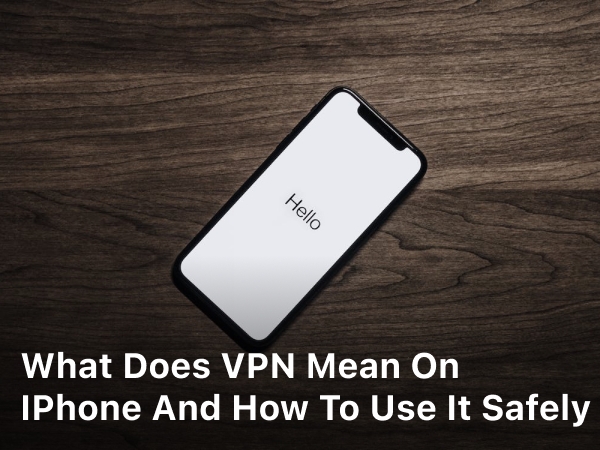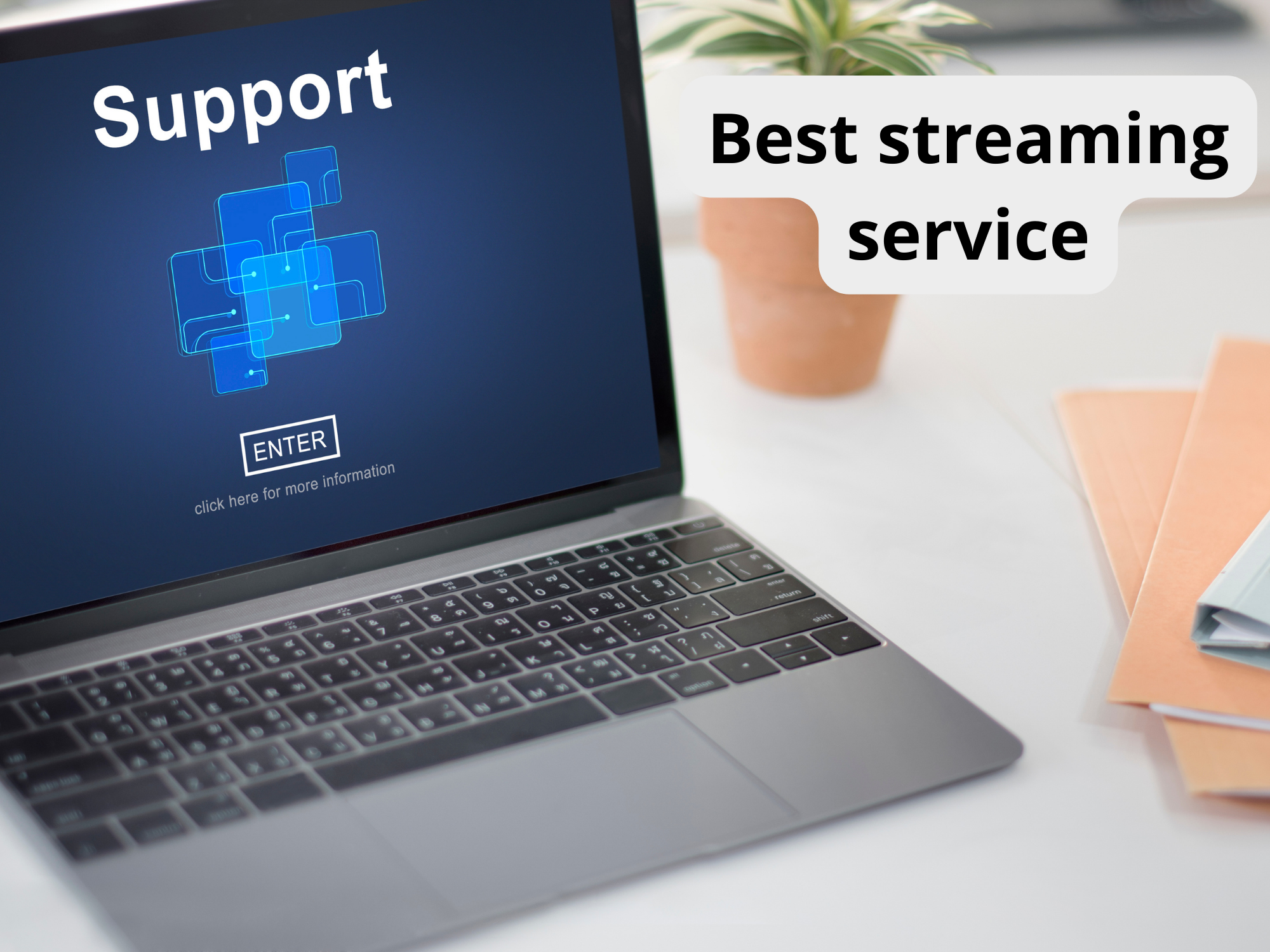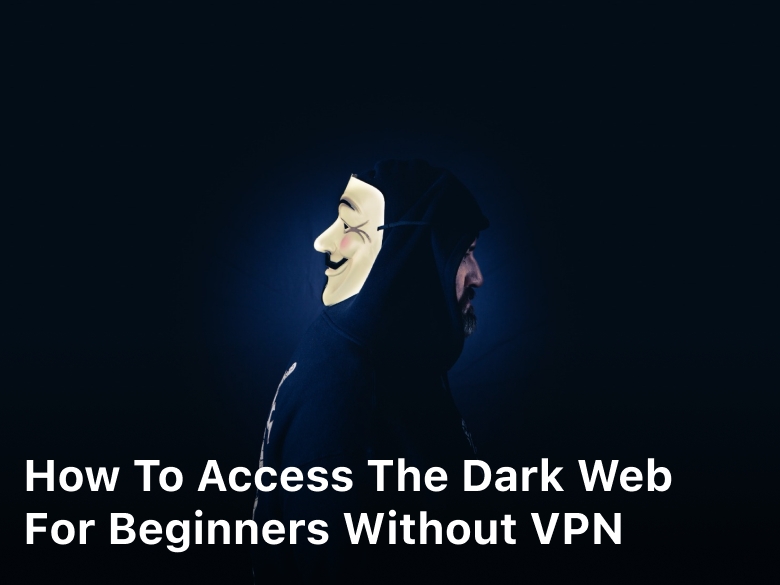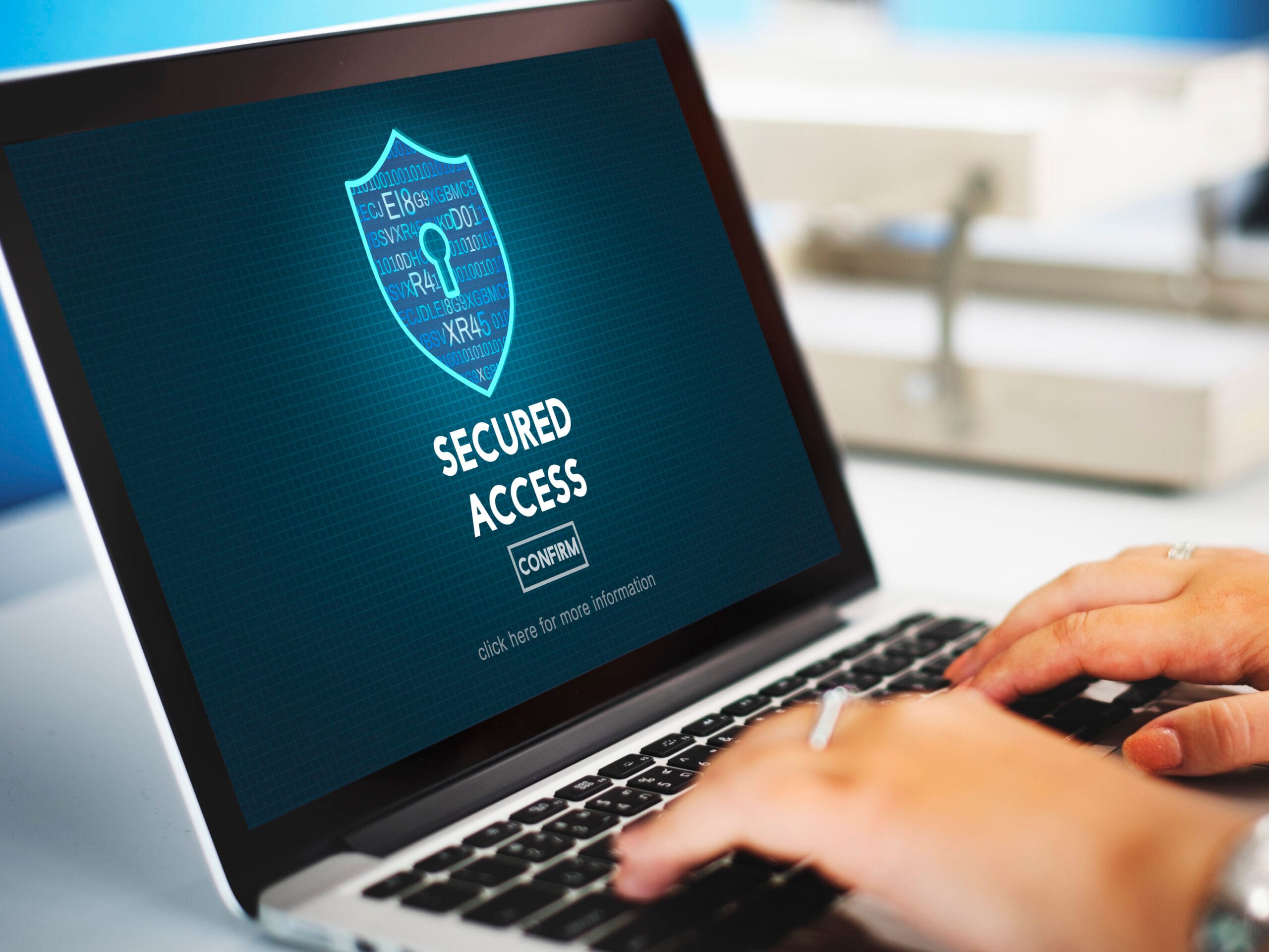
What Does VPN Mean on iPhone and How to Use It Safely – In this comprehensive article, we will explore the meaning of VPN on iPhone and delve into its benefits, functionality, and how to use it effectively. Discover why VPNs are essential for safeguarding your online privacy and security while using your iPhone.
In the digital age, with cyber threats and data breaches on the rise, ensuring our online privacy and security has become more critical than ever. For iPhone users, a Virtual Private Network (VPN) is a powerful tool that provides an extra layer of protection when connecting to the internet. But what exactly does VPN mean on iPhone, and how does it work? Let’s dive into the world of VPNs and understand their significance in safeguarding your online activities.
What Is A VPN?
A VPN, or Virtual Private Network, is a technology that creates a secure and encrypted connection between your device (in this case, your iPhone) and the internet. When you connect to a VPN, your data traffic is routed through a secure server, making it appear as if you are accessing the internet from a different location.
How Does a VPN Work?
When you use a VPN on your iPhone, it acts as a middleman between your device and the internet. Here’s a simplified breakdown of how it works:
- Encryption: When you connect to a VPN, all the data transmitted between your iPhone and the VPN server is encrypted. This means that even if someone intercepts your data, they won’t be able to decipher it without the encryption key.
- IP Address Concealment: Your iPhone’s IP address, which reveals your approximate location, is masked by the VPN server’s IP address. This helps protect your privacy and anonymity while browsing.
- Secure Connection: The VPN creates a secure “tunnel” through which your data travels, safeguarding it from potential hackers and cybercriminals.
Keep Reading : What Does a VPN Do To Keep You Safe While Browsing
Why Would I Need a VPN on iPhone?
Using a VPN on your iPhone offers a plethora of benefits:
Enhanced Security
One of the primary reasons why using a VPN on your iPhone is crucial is because it provides enhanced security for your online activities. In the digital age, where cyber threats and data breaches are rampant, safeguarding your personal information and sensitive data has become a top priority.
Let’s delve deeper into how a VPN enhances security and protects you from potential threats.
- Data Encryption: When you connect to a VPN on your iPhone, all the data transmitted between your device and the VPN server is encrypted. Encryption is the process of encoding data in such a way that only authorized parties can access it. This means that even if a hacker manages to intercept your data, they won’t be able to make any sense of it without the encryption key.
- Protection from Hackers: Public Wi-Fi networks, such as those found in cafes, airports, and hotels, are often vulnerable to cyberattacks. Hackers can easily intercept data being transmitted over these unsecured networks. However, when you use a VPN, your data is encrypted, making it nearly impossible for hackers to decipher any information they intercept.
- Identity and IP Address Protection: Your IP address is a unique identifier that reveals your approximate location and internet service provider. Cybercriminals can use this information to track your online activities or launch targeted attacks. With a VPN, your real IP address is masked by the VPN server’s IP address, providing you with anonymity and preventing anyone from tracing your online actions back to you.
- Shielding Against DNS Leaks: Domain Name System (DNS) leaks occur when your device inadvertently bypasses the VPN and sends DNS queries directly to your internet service provider. This can expose your online activities even if you’re connected to a VPN. A reputable VPN implements measures to prevent DNS leaks, ensuring that all your DNS requests are securely routed through the VPN.
- Preventing Data Logging: Trustworthy VPN providers follow a strict no-logs policy. This means that they do not store any records of your online activities, ensuring that your browsing history, download history, and other online behaviors remain private and confidential.
- Protection from Government Surveillance: In some regions, government surveillance and data monitoring are prevalent. By using a VPN, you add an extra layer of protection against potential surveillance, as your internet traffic is encrypted and your real IP address is hidden.
- Secure File Sharing: For individuals or businesses that frequently share sensitive files and documents, a VPN ensures that all file transfers are encrypted, minimizing the risk of unauthorized access or data interception.
- Safeguarding Personal Information: When accessing websites and services, especially while making online transactions or submitting personal information, a VPN protects your sensitive data from being intercepted by malicious entities.
Keep Reading : How to Watch women’s world cup streaming with VPN
Bypassing Geo-Restrictions
One of the most significant advantages of using a VPN on your iPhone is the ability to bypass geo-restrictions. Geo-restrictions are limitations imposed by content providers, streaming services, websites, or governments based on the user’s geographical location.
These restrictions can prevent users from accessing certain content or services that are only available in specific regions. Let’s explore how a VPN allows you to bypass these restrictions and access a world of previously inaccessible content.
- Access to Global Content: Different countries have different licensing agreements and copyright laws, resulting in content being available in one region but not in others. For example, certain movies, TV shows, or music may be accessible on streaming platforms in the United States but not in Europe or Asia. By connecting to a VPN server in the United States, you can effectively “trick” the content provider into thinking you are located there, granting you access to the content that was previously unavailable in your actual location.
- Streaming Services: Many popular streaming services, such as Netflix, Hulu, Amazon Prime Video, and BBC iPlayer, have region-specific libraries. Subscribers in the United States, for instance, might have access to different content than those in the United Kingdom. With a VPN, you can change your virtual location to that of the desired country and unlock a vast array of shows, movies, and documentaries available to subscribers in that region.
- Evading Government Censorship: In some countries, governments impose strict internet censorship, blocking access to specific websites, social media platforms, or news outlets. By using a VPN, you can circumvent these restrictions and access the open internet as if you were browsing from a different country. This enables users in heavily censored regions to enjoy unrestricted access to information and online services.
- Online Gaming and Game Releases: Video game publishers often stagger game releases across different regions. Some games may become available in North America before being released in Europe or Asia. With a VPN, gamers can change their virtual location to the region where the game has already been released, allowing them to play it ahead of its official launch in their home country.
- Sports Events: Sporting events, especially live broadcasts, may be subject to geographic broadcasting restrictions. Using a VPN, sports enthusiasts can connect to a server in a country where the event is being broadcasted without restrictions, allowing them to stream the event in real-time, regardless of their actual location.
- Booking Flights and Hotel Deals: Flight and hotel prices can vary based on the user’s location. By using a VPN to change your virtual location, you can potentially find better deals and save money on travel bookings.
It’s important to note that while a VPN enables you to bypass geo-restrictions and access restricted content, it is essential to respect copyright laws and terms of service of content providers. Additionally, some websites and streaming services have implemented measures to detect and block VPN traffic.
In such cases, using a reliable and reputable VPN service that regularly updates its server IPs and employs obfuscation techniques can increase your chances of successful access.
Keep Reading : How to use a VPN for Disney Plus Streaming Anywhere
Public Wi-Fi Protection
Public Wi-Fi networks, such as those found in coffee shops, airports, hotels, and shopping malls, offer convenience and accessibility for users on the go.
However, these networks can be inherently insecure and pose significant risks to your online privacy and security. When you connect to a public Wi-Fi network without proper protection, you expose your data to potential hackers and cybercriminals who may be lurking on the same network.
Using a VPN on your iPhone provides crucial public Wi-Fi protection, ensuring that you can browse and connect safely even on unsecured networks. Let’s explore how a VPN safeguards your data and privacy while using public Wi-Fi.
- Data Encryption: When you connect to a public Wi-Fi network, your data is transmitted over the airwaves and can be intercepted by malicious actors using readily available tools. However, when you use a VPN, all data sent from your iPhone is encrypted before it leaves your device. This means that even if someone manages to intercept your data packets, they will only see a jumble of encrypted characters, making it virtually impossible for them to decipher your sensitive information.
- Mitigating Man-in-the-Middle Attacks: One of the most common threats on public Wi-Fi networks is the “man-in-the-middle” attack, where an attacker intercepts communications between your device and the network. They can eavesdrop on your online activities, steal login credentials, and even inject malicious content into your browsing sessions. A VPN’s encryption prevents these attacks, ensuring that your data remains secure and inaccessible to potential attackers.
- IP Address Concealment: When you connect to a public Wi-Fi network, your IP address is visible to everyone on that network. Cybercriminals can use this information to track your location and potentially launch targeted attacks. With a VPN, your real IP address is masked, and you appear to be connecting from the VPN server’s location, providing an additional layer of anonymity and protecting your online identity.
- Secure Browsing: Public Wi-Fi networks are often unencrypted, meaning that any information you send or receive while connected can be easily intercepted. This includes login credentials, credit card details, and personal messages. By using a VPN, you create a secure “tunnel” between your iPhone and the VPN server, ensuring that all your data travels through an encrypted channel and remains safe from prying eyes.
- Protection from Sniffing and Packet Inspection: Cybercriminals can use packet sniffing and inspection techniques to monitor and analyze data flowing through the public Wi-Fi network. A VPN prevents this by encrypting your data, making it indecipherable to anyone attempting to intercept it.
- Peace of Mind: When you use a VPN on your iPhone while connected to public Wi-Fi, you can browse and conduct online transactions with peace of mind, knowing that your data is protected and secure. This is particularly important when accessing sensitive information, such as online banking or personal emails, on the go.
It’s important to choose a reliable and trustworthy VPN service for public Wi-Fi protection. Not all VPNs are created equal, and some may have vulnerabilities or data logging practices that compromise your privacy. Opt for a VPN service that has a strong track record, positive reviews, and a transparent privacy policy with a strict no-logs policy.
Keep Reading : Best VPN for Australia
Anonymous Browsing
In today’s digital world, online privacy has become a major concern for internet users. Many websites and online services track users’ activities, collecting data on their browsing habits, interests, and even personal information. This data is often used for targeted advertising or sold to third parties, compromising users’ privacy.
However, with a VPN on your iPhone, you can achieve anonymous browsing, shielding your online identity and activities from prying eyes. Let’s delve into how a VPN enables anonymous browsing and the benefits it offers:
- Concealing Your IP Address: When you connect to the internet without a VPN, your IP address serves as a unique identifier, revealing your approximate location and internet service provider. Websites and online services can use this information to track your online activities and link them to your real-world identity. However, when you use a VPN, your true IP address is replaced with the IP address of the VPN server you connect to. This effectively hides your actual location and makes it challenging for websites to trace your online actions back to you.
- Preventing Tracking and Targeted Advertising: Many websites use cookies and other tracking technologies to monitor users’ behavior and interests. This information is then used to deliver targeted ads and personalized content. With a VPN, your online activities are shielded by encryption, preventing websites from collecting data on your browsing habits. As a result, you are less likely to be bombarded with targeted ads based on your browsing history.
- Bypassing Website Blocks and Filters: In some regions, websites and online services may be blocked or filtered by internet service providers or governments. By using a VPN, you can access these blocked websites by connecting to a server in a different location where the content is accessible. This enables you to browse the web freely and access information without restrictions.
- Private Search and Online Activity: When you use a search engine without a VPN, your search queries are typically logged and associated with your IP address. This means that your search history may be used to build a profile of your interests and preferences. With a VPN, your search activity remains private, as your IP address is masked, preventing search engines from linking your queries to your identity.
- Secure Online Transactions: Anonymous browsing with a VPN is especially crucial when conducting online transactions. By encrypting your data, a VPN ensures that your credit card information and other sensitive details remain safe from potential hackers or data interceptors.
- Freedom of Expression: In regions with strict internet censorship and surveillance, anonymous browsing with a VPN allows individuals to express their opinions freely without fear of reprisals. Dissidents, journalists, and activists can communicate and access information without the risk of being identified and targeted by authorities.
- Protecting Personal Identifiable Information (PII): When you browse the internet without a VPN, various websites and services may request your personal identifiable information (PII). This data could potentially be exposed in the event of a data breach. By using a VPN, you reduce the risk of your PII falling into the wrong hands.
Evade Internet Censorship
In many parts of the world, internet censorship is a prevalent issue, with governments and authorities imposing restrictions on online content and communication. This censorship can take various forms, including website blocks, content filtering, and restrictions on social media platforms.
However, with the help of a VPN on your iPhone, you can effectively evade internet censorship and regain access to the open internet. Let’s explore how a VPN empowers users to bypass internet censorship and enjoy unrestricted online browsing:
- Bypassing Website Blocks: Internet service providers and governments often block access to specific websites or services they consider objectionable or politically sensitive. By using a VPN, you can connect to servers in other countries where these websites are not blocked. This effectively circumvents the censorship measures, allowing you to access blocked content and information.
- Access to Global Information: Internet censorship may lead to a limited flow of information within a region. By connecting to a VPN, you can access global news, websites, and social media platforms that may be restricted in your location. This enables you to stay informed about international events and diverse perspectives.
- Encrypted Traffic: VPNs encrypt your internet traffic, making it difficult for internet service providers and government agencies to monitor your online activities. Even if they attempt to inspect your data, they will only see encrypted data passing between your iPhone and the VPN server, ensuring your online activities remain private.
- Overcoming Communication Restrictions: In some regions, messaging apps and voice-over-IP services, such as WhatsApp, Telegram, Skype, and Viber, may be blocked or restricted. A VPN allows you to bypass these limitations and maintain communication with friends, family, and colleagues using these platforms.
- Protecting Online Privacy: In regions with strict internet censorship, accessing certain websites or expressing dissenting opinions may result in surveillance or even legal consequences. Using a VPN helps protect your online privacy, as your internet traffic is routed through an encrypted tunnel, preventing authorities from monitoring your online activities.
- Safe and Anonymous Expression: VPNs enable individuals, including activists, journalists, and bloggers, to express their opinions and share information without fear of reprisals. By using a VPN, users can maintain their anonymity, reducing the risk of being identified and targeted by censors or authorities.
- Academic and Educational Purposes: In some educational institutions or workplaces, internet access may be limited, preventing students and professionals from accessing valuable research, educational resources, or online tools. A VPN allows users to bypass these restrictions, facilitating their academic and professional growth.
- Supporting Internet Freedom: By using a VPN to evade internet censorship, you contribute to the promotion of internet freedom and unrestricted access to information. Supporting a free and open internet is essential for a democratic society and fosters the exchange of ideas and knowledge on a global scale.
It is crucial to choose a VPN provider that offers robust security measures, reliable server connections, and a strong commitment to user privacy. Additionally, keep in mind that while a VPN can help you evade internet censorship, it is essential to remain respectful of the local laws and regulations when accessing content in different regions.
How to Choose a VPN for iPhone
Selecting the right VPN for your iPhone is crucial to ensure a seamless and secure experience. Here are some factors to consider when choosing a VPN:
- Security Protocols: Look for VPNs that offer strong encryption protocols like OpenVPN, IKEv2, or L2TP/IPsec.
- No-Logs Policy: Opt for VPN providers that have a strict no-logs policy, ensuring they do not store any of your online activities.
- Server Locations: Make sure the VPN has servers in locations relevant to your needs, such as accessing geo-restricted content.
- Connection Speed: Check for VPNs that provide fast and stable connections to prevent lag or buffering while browsing or streaming.
- User-Friendly Interface: Choose a VPN with a user-friendly app that is easy to navigate on your iPhone.
What Does VPN Mean on iPhone?
VPN on iPhone means having the ability to secure your internet connection, protect your data from prying eyes, and access online content without limitations. With a VPN, your online activities are shielded from potential threats, providing you with peace of mind while using your iPhone for various purposes.
How to Use a VPN on iPhone
Using a VPN on your iPhone is a straightforward process. Here’s a step-by-step guide to help you get started:
- Choose a VPN: Select a reputable VPN service from the App Store that suits your requirements.
- Install the App: Download and install the VPN app on your iPhone.
- Sign Up or Log In: Create an account or log in if you already have one with the VPN provider.
- Connect to a Server: Open the VPN app and connect to a server of your choice.
- Enjoy Secure Browsing: Once connected, your iPhone’s internet traffic is encrypted and secure.
Frequently Asked Questions
Q1: Is using a VPN on an iPhone legal?
A1: Yes, using a VPN on your iPhone is legal in most countries. However, it’s essential to use it for legitimate purposes and not engage in any illegal activities.
Q2: Can I use a free VPN on my iPhone?
A2: While free VPNs are available, they often come with limitations, such as slower speeds, data caps, and potential privacy concerns. Paid VPNs typically offer better performance and more robust security features.
Q3: Can I use a VPN on all my devices simultaneously?
A3: VPNs often allow multiple simultaneous connections, so you can use the same VPN account on multiple devices, including your iPhone, laptop, tablet, etc.
Conclusion
In conclusion, understanding what VPN means on an iPhone is vital for anyone concerned about online privacy, security, and accessing geo-restricted content. VPNs are powerful tools that encrypt your data, protect your online activities, and offer you the freedom to explore the internet safely.
By following the guidelines on choosing a VPN and utilizing it effectively on your iPhone, you can safeguard your digital presence and enjoy a more secure online experience. So, take the step towards securing your internet journey and embrace the power of VPN on your iPhone today.






